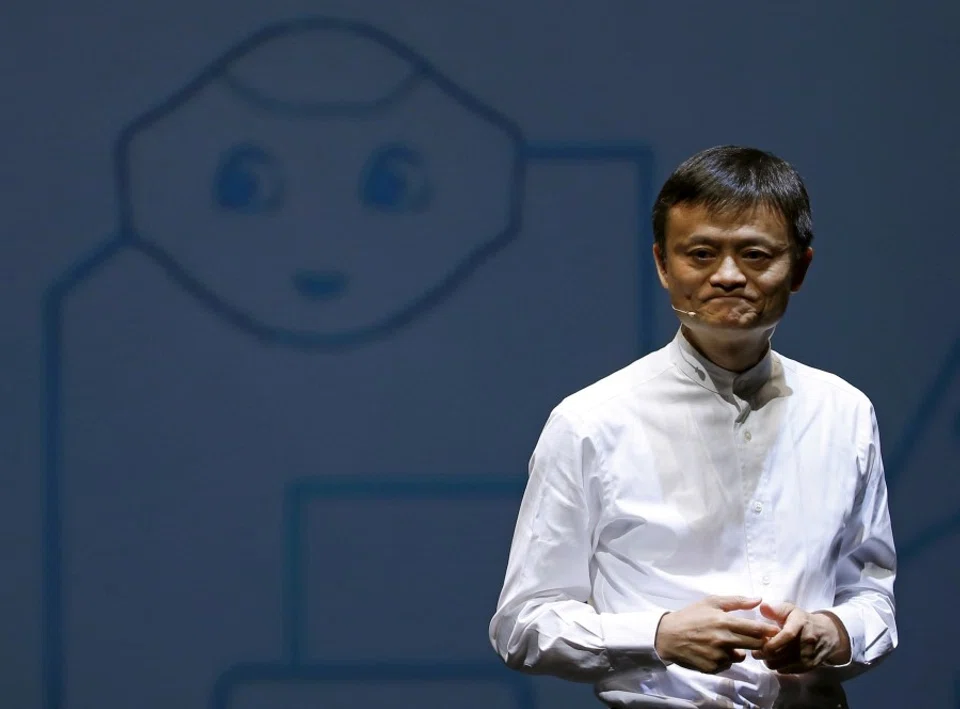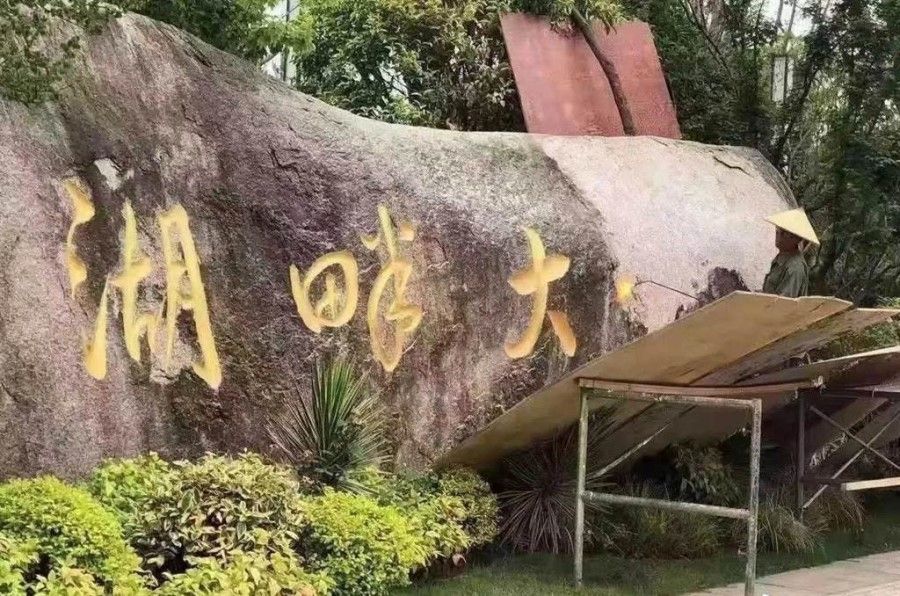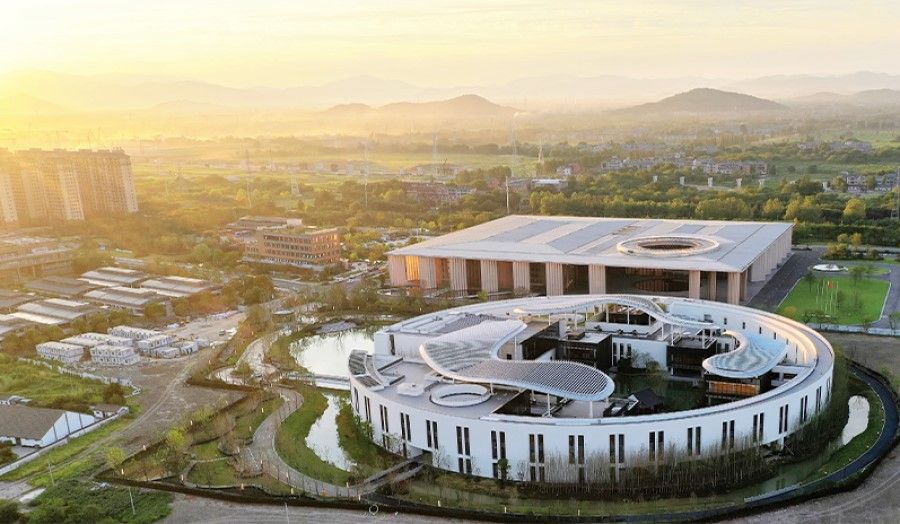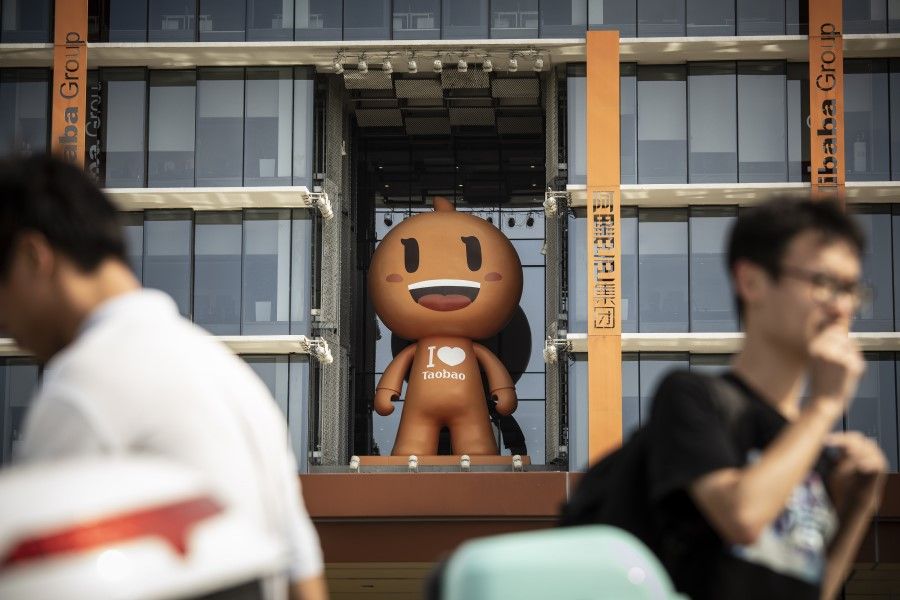The end of 'Papa Ma Yun' and his Hupan University

"With Papa Ma's platform, we can reach customers within and outside of China..."
I was momentarily stunned when a Chinese entrepreneur I interviewed a few years ago suddenly said the words "Papa Ma". Even though I knew that was the nickname for Alibaba founder Jack Ma, to hear someone use it so casually was a little jarring, not to mention that the interview subject was also an entrepreneur of some note.
At the time, Papa Ma was still a superstar businessman adored by the masses, and many young entrepreneurs dreamed of entering Hupan University, which Ma co-founded and headed. But this past weekend, the name of this private school was suddenly changed to "Zhejiang Hupan Entrepreneurship Research Center". Footage of the inscribed characters 湖畔大学 (Hupan University) being removed from a stone at the university entrance beside West Lake was circulated online, sparking a spate of comments.

What's in a name?
Some believe that the sudden name change is due to amendments to a law last week to tighten regulations on private schools. A document released by eight ministries on 18 May may shed light on the underlying reasons.
The document dated 13 May and titled "Views on the Registration and Use of Names for Universities and Institutions" noted that in recent years, some companies have set up internal training institutes and community organisations, falsely calling them "universities" and "institutions" without approval. These entities have gone on to recruit students. This has misled the public and disrupted the education system, leading to adverse effects. Since then, other than approved institutions and organisations, others are not allowed to use the words "university" or "institution" in their signboards, advertisements and other publicity, or in their activities.
While the document did not name Hupan University, the institution's name change and subsequent clarification that it is not listed as an academic education institution and that its name was changed "to avoid any misunderstanding" all fit with the points in the document. As for how Hupan University "disrupted the education system" and what "adverse effects" it has had, the authorities did not elaborate. But this school that business people are flocking to has had poor reviews among the general public because of its teaching model.
Hupan University does not come under the Ministry of Education, but its entry criteria are even higher than well-known institutions such as Peking University and Tsinghua University. Students need to have at least three years of entrepreneurial experience with at least 30 staff and 30 million RMB (S$6.22 million) in revenue, as well as recommendations from three well-known people, at least one of whom is a "designated referrer" at the level of Jack Ma. With these demanding criteria, only familiar names are accepted at the school: Fok Kai Man, grandson of late Hong Kong tycoon Henry Fok; Zhang Xuhao, founder of food delivery platform Ele.me; and Su Hua, co-founder and CEO of video platform Kuaishou are among the school's alumni.
Some people have compared Hupan University to the Donglin Academy of the Ming dynasty, claiming that Ma is using the school to expand his influence and plant people who will speak for him within the system.

Given that Jack Ma is a co-founder and the first head of Hupan University, the school also takes its name from Hupan Garden in Hangzhou, where Ma first started his business. Netizens joke that Hupan University is Ma's "lakeside clubhouse" (hupan 湖畔 means lakeside), or "CEO club", an exclusive circle where rich people network and exchange resources, like the Taishan Club established by top tycoons including Lenovo founder Liu Chuanzhi, and the Jiangnan Club that Jack Ma financed and co-founded. Some people have compared Hupan University to the Donglin Academy of the Ming dynasty, claiming that Ma is using the school to expand his influence and plant people who will speak for him within the system.
Networking 'CEO club' now a liability
The private Jiangnan Club was closed in 2014, while there is also talk that the Taishan Club - with an average worth of 100 million RMB among its members - has been dissolved. As for Hupan University, established in 2015, its enrolment jumped from 150 in its first year to 4,000 in 2018. Apart from having a branding as "protection", the school is also supported by the halo around Papa Ma and the brilliance of the Alibaba group.
But with policymakers clearly clamping down on online platform monopolies and so-called "disorderly expansion of capital", at the end of last year the listing of Ant Group was suspended, while this year Alibaba was heavily fined for monopolistic practices; at the centre of it all, Jack Ma went incognito for quite a while. Last week, he showed up at a group event, and his thin figure had people wondering what he has gone through the past six months. Hupan University has also been affected, and it is said that it has stopped accepting students this year.

From hero to villain
Is Jack Ma building up his own "Donglin Party" in the name of running a school? Does the name change indicate that the authorities are concerned that the disorderly expansion of capital will encroach on the education sector? No one can give a definitive answer. But what is certain is that given the chaos of university student debt due to credit services Huabei and Jiebei, the monopolistic ways of Taobao, and his own comments that the "996 culture" of working from 9 am to 9 pm six days a week is good, the once-beloved Papa Ma is now seen as a capitalist who exploits the people. Even his image as a supporter of village teachers, and the "Principal Ma" pet name that he has been so proud of are not met with approval.
Some netizens have contrasted Hupan University to Fuyao University of Science and Technology established by Fuyao Glass owner Cao Dewang. They feel that the former trains exploitative businessmen, while the latter trains technical talents that China urgently needs; Jack Ma is a high-profile attention seeker, while Cao quietly gets down to real work. The difference between the two is clear.
The debate could go on for ages over whether it is better to be a businessman or technical worker, or whether it is a sin for an entrepreneur to have capital and be high-profile. But with Jack Ma and Alibaba off their pedestal, the once out-of-reach Hupan University will also lose its lustre. In future, will other entrepreneurs name-drop Papa Ma so easily?
